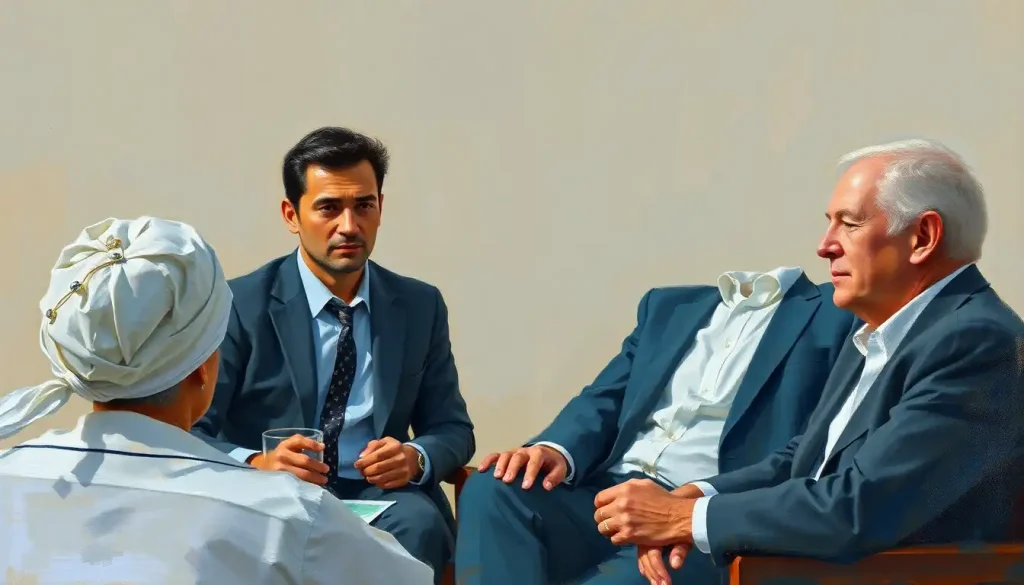Money can change the world, and at Cornell University, students are learning exactly how to make that happen through groundbreaking programs in impact investing. This innovative approach to finance is reshaping the way we think about investments, blending profit with purpose in a way that’s both exciting and transformative.
Imagine a world where your money doesn’t just grow – it grows goodness. That’s the essence of impact investing, a concept that’s gaining traction faster than a New York minute. At its core, impact investing is about making financial decisions that not only yield returns but also create positive social and environmental change. It’s like planting a money tree that bears fruit for both your wallet and the world.
Cornell University, nestled in the picturesque Finger Lakes region of New York, has long been a trailblazer in education. Now, it’s leading the charge in sustainable finance education, proving that Ivy League smarts can be applied to solving some of the world’s most pressing problems. The university’s commitment to this field is as solid as the iconic clock tower that chimes across campus.
As the business world evolves, so too does the importance of impact investing in higher education. It’s no longer enough to simply understand balance sheets and profit margins. Today’s business leaders need to grasp the delicate balance between financial success and social responsibility. Cornell’s programs are designed to equip students with this crucial skillset, preparing them to be the changemakers of tomorrow.
The Birth of a Movement: Cornell’s Impact Investing Program
Cornell’s journey into the realm of impact investing didn’t happen overnight. It’s been a gradual evolution, much like the slow but steady growth of a well-tended investment portfolio. The seeds were planted years ago when forward-thinking faculty members recognized the growing importance of sustainable finance in the global economy.
What started as a few elective courses has blossomed into a comprehensive program that’s turning heads in both academic and professional circles. The curriculum is as diverse as the student body itself, covering everything from the basics of financial analysis to the nuances of measuring social impact. It’s a smorgasbord of knowledge that leaves students hungry for more.
One of the most remarkable aspects of Cornell’s approach is the collaboration between different schools and departments. It’s like a grand orchestra, with each section playing its part to create a harmonious whole. The Johnson Graduate School of Management, the School of Industrial and Labor Relations, and the College of Agriculture and Life Sciences all contribute their unique expertise to the program. This interdisciplinary approach ensures that students get a well-rounded education that prepares them for the complex realities of the impact investing world.
Academic Offerings: From Classroom to Boardroom
For undergraduates eager to dip their toes into the impact investing pool, Cornell offers a range of courses that provide a solid foundation. These classes aren’t just about crunching numbers – they’re about understanding the power of finance to drive positive change. Students might find themselves analyzing case studies of successful impact investments one day and debating the ethics of various investment strategies the next.
Graduate students looking to dive deeper into the world of impact investing have even more options at their disposal. The MBA program at the Johnson Graduate School of Management offers a specialization in sustainable global enterprise, which includes a heavy focus on impact investing. It’s like getting a black belt in do-good finance.
But Cornell’s commitment to impact investing education doesn’t stop at the campus gates. The university also offers executive education and professional development opportunities for those already in the workforce. These programs are like a shot of espresso for your career, providing a quick but potent boost of knowledge that can be immediately applied in the real world.
Research and Innovation: Pushing the Boundaries
At Cornell, impact investing isn’t just taught – it’s actively researched and innovated upon. Faculty members are like modern-day explorers, venturing into uncharted territories of sustainable finance. Their research projects cover a wide range of topics, from developing new metrics for measuring social impact to exploring the potential of blockchain technology in impact investing.
Students aren’t just passive observers in this process. They’re active participants, often leading their own research initiatives and case studies. It’s like a laboratory where the experiments involve dollars and cents instead of test tubes and Bunsen burners.
Cornell’s impact investing program also benefits from partnerships with industry leaders and organizations. These collaborations bring real-world insights into the classroom and provide students with invaluable networking opportunities. It’s like having a direct line to the movers and shakers of the impact investing world.
Putting Theory into Practice: Real-World Impact
One of the most exciting aspects of Cornell’s impact investing program is the opportunity for students to manage real investment funds. It’s not Monopoly money they’re playing with – it’s actual capital that’s being invested in real-world projects. Talk about learning by doing!
These student-managed funds are like miniature versions of professional impact investing firms. Students are responsible for everything from sourcing deals to conducting due diligence to making investment decisions. It’s a hands-on experience that’s worth its weight in gold (or should we say, impact?).
But the practical applications of Cornell’s impact investing education extend beyond campus. The university has strong connections with firms and organizations in the impact investing sector, opening doors to internship and career opportunities for students. It’s like having a golden ticket to some of the most innovative and purpose-driven companies in the world.
And let’s not forget about the alumni success stories. Cornell graduates are making waves in the impact investing world, from founding their own social enterprises to leading impact investing divisions at major financial institutions. These alumni serve as inspiration for current students and proof of the program’s effectiveness.
The Road Ahead: Cornell’s Vision for Impact Investing
Cornell isn’t content to rest on its laurels. The university has ambitious plans to expand its impact investing programs, staying ahead of the curve in this rapidly evolving field. New courses are being developed, research initiatives are being launched, and partnerships are being forged.
As the world grapples with challenges like climate change, social inequality, and sustainable development, Cornell is focusing on these emerging trends in its impact investing curriculum. Students are learning about cutting-edge concepts like environmental impact investing, which aims to drive sustainable change through financial decisions.
Cornell is positioning itself not just as a participant in the impact investing movement, but as a leader shaping its future. The university is training the next generation of impact investors who will go on to influence policy, drive innovation, and create positive change on a global scale.
The Power of Purpose-Driven Finance
As we look back at Cornell’s contributions to impact investing education, it’s clear that the university is punching well above its weight. From its comprehensive curriculum to its innovative research to its real-world applications, Cornell is setting a new standard for sustainable finance education.
The skills and knowledge gained through these programs are more than just resume boosters – they’re tools for changing the world. In an era where business as usual is no longer enough, the ability to balance profit and purpose is becoming increasingly valuable. Cornell graduates are entering the workforce not just as finance professionals, but as agents of positive change.
For students interested in impact investing, Cornell offers a unique opportunity to be at the forefront of this exciting field. Whether you’re an undergraduate just starting to explore your options or a seasoned professional looking to pivot your career, Cornell’s impact investing programs have something to offer.
The world of finance is changing, and Cornell is leading the charge. By embracing sustainable finance and impact investing, the university is not just preparing students for successful careers – it’s empowering them to make a difference. After all, what could be more rewarding than using your financial acumen to create a better world?
So, if you’re ready to dive into the world of impact investing, why not consider joining an impact investing group? These communities of like-minded individuals are driving positive change through strategic financial decisions. Or, if you’re looking to gain hands-on experience, an impact investing internship could be the perfect way to launch your career in sustainable finance.
For those who prefer a more flexible learning approach, there are numerous impact investing online courses available. These programs can help you transform your portfolio for both social and financial returns, all from the comfort of your own home.
And let’s not forget about the exciting world of venture capital impact investing. This innovative approach is driving social change through profitable investments, proving that doing good and doing well are not mutually exclusive.
If you’re looking for inspiration, you might want to check out the Georgetown Impact Investing Group. Like Cornell, Georgetown is making waves in the world of impact investing education, driving social change through innovative finance.
The future of finance is here, and it’s all about impact. Whether you’re a student at Cornell or simply someone interested in making your money matter, the world of impact investing offers endless possibilities. So why not take that first step? After all, the journey of a thousand miles begins with a single investment.
References:
1. Bugg-Levine, A., & Emerson, J. (2011). Impact investing: Transforming how we make money while making a difference. John Wiley & Sons.
2. Höchstädter, A. K., & Scheck, B. (2015). What’s in a name: An analysis of impact investing understandings by academics and practitioners. Journal of Business Ethics, 132(2), 449-475.
3. Roundy, P., Holzhauer, H., & Dai, Y. (2017). Finance or philanthropy? Exploring the motivations and criteria of impact investors. Social Responsibility Journal, 13(3), 491-512.
4. Clarkin, J. E., & Cangioni, C. L. (2016). Impact investing: A primer and review of the literature. Entrepreneurship Research Journal, 6(2), 135-173.
5. Findlay, S., & Moran, M. (2019). Purpose-driven finance: The rise of social impact investing, bonds and derivatives. Journal of Business Ethics, 154(4), 931-948.
6. Cornell University. (2023). Sustainable Global Enterprise. Johnson Graduate School of Management. https://www.johnson.cornell.edu/programs/full-time-mba/curriculum/mba-programs/one-year-mba/sustainable-global-enterprise/
7. Global Impact Investing Network. (2023). What You Need to Know About Impact Investing. https://thegiin.org/impact-investing/need-to-know/
8. World Economic Forum. (2022). Impact Investing: A Primer for Family Offices. https://www3.weforum.org/docs/WEF_Impact_Investing_A_Primer_for_Family_Offices_2014.pdf












Would you like to add any comments? (optional)